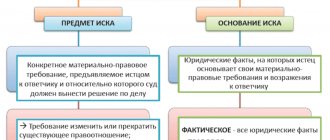Home » Buying and selling an apartment » Forced eviction from an apartment through the court
2
In any situation involving the need to check out the tenants of an apartment, it is better to come to an amicable agreement. This solves almost all problems, but, unfortunately, it is not always possible. As a consequence, there is a need to deprive people of registration forcibly. How this can be done and what features this procedure has - read in this article.
Grounds and reasons
When filing a claim in court to discharge a tenant, the applicant must have compelling reasons for such a request .
Reasons for discharge permitted by law:
- The couple, who lived in the same apartment, filed for divorce . If one of them is the owner or tenant of the apartment, then after the divorce the second one loses the right to live in the apartment. We talked in more detail about how, after a divorce, ex-spouses and children can be discharged if they are not homeowners, here.
- A citizen registered in an apartment has not actually lived on its territory for a long time. If he is not its owner, then he can also be evicted, citing an unwillingness to pay for utilities for him.
- The tenant violates the living conditions in the apartment : behaves hooliganly, makes noise at inappropriate times, or commits other antisocial acts. In this case, the expulsion and eviction of a citizen is possible only with prior warning.
- The building in which the apartment is located is in disrepair and is subject to demolition . In this case, the residents are discharged and given new housing.
- The tenant is avoiding paying utility bills . In such a situation, you can only write out the tenant of the apartment or a citizen who is not its owner. Moreover, the period of non-payment must be at least six months, and the fact of lack of payments must be documented.
- The apartment was received by the owner as a gift - in such a situation, he has the right to discharge all citizens who are registered in it, without the consent of the persons being discharged.
- The citizen registered in the apartment is in prison or undergoing compulsory military service . In this case, he can also be discharged from housing without any problems.
This basis for deregistration applies only to situations with social housing - in this case, the owner of the apartment cannot be removed from the registration register.
It is worth considering that the listed grounds differ depending on who the offender is - the owner of the apartment, a simple tenant or a tenant under a social tenancy agreement .
Features of the eviction procedure depending on the situation
Each situation has its own nuances that should be taken into account when moving out. Let's look at what you need to take into account.
Eviction of a stranger
It often happens that the living space is occupied by a citizen who is not part of the owner’s family. This could be a former spouse or his relatives, a tenant who previously ran a joint household with the owner, etc.
In this case, it is necessary to prove in court the absence of family relations. The following is used as evidence:
- witness statements;
- certificate of divorce;
- an extract from Rosreestr confirming that the person registered has other housing;
- other evidence.
Only the owner of privatized housing can discharge a former family member. In this case, the court may reserve the evicted person the right to use housing free of charge for a certain period. In addition, the court may oblige the owner to provide the former family member with other housing (this is allowed if the owner is obligated to provide alimony to the tenant).
If the apartment is municipal, the former family member retains the right to reside. However, when cohabitation is impossible, it is permissible to raise the issue of forced exchange of housing.
Extract is also possible when there is a change of ownership. But even in this case, everything is not so simple. If the tenant is an employer who has refused privatization, then he cannot be discharged under any circumstances.
Immoral behavior of the tenant
If a resident violates the rights and legitimate interests of his neighbors, he may be evicted from the occupied living space. Such violations are recognized as:
- hooliganism (drunkenness, fighting, indecent behavior, etc.);
- violation of the law on silence;
- personal insult;
- slander, etc.
To go to court, you will need to collect evidence of the regularity of illegal actions. As evidence, you can use witness statements, documents from law enforcement agencies, etc.
Misuse of premises or violation of rules
The residential premises cannot be used as a warehouse, office, production workshop, gym, place for keeping animals, etc. Violation of sanitary and hygienic standards is expressed in the fact that the living space is kept in a condition that promotes the occurrence of infections and interferes with the comfortable living of citizens.
In addition, other requirements may be violated. For example, a tenant may incorrectly use communications and thereby violate fire safety rules, intentionally cause damage to structures, etc.
Illegal registration at place of residence
People who have no reason to do so can move into the apartment. This happens due to the carelessness of institutional employees or in case of forgery of documents.
Discharge of this category of citizens can be carried out in one of two ways:
- Cancellation of permanent registration with the Federal Migration Service.
- Applying to the court to evict a person who does not have a legal right to housing.
In the first case, you will need to write a statement describing the situation in detail. The facts stated in the application are verified. If the stated circumstances are confirmed, all violations are eliminated and the registration is cancelled.
Non-payment of utility bills
If payments for the provision of housing and communal services are not transferred for more than six months, the owner (municipality or state) has the right to evict the tenant and members of his family, but at the same time provide the residents with an apartment or room of a smaller area.
Sometimes it happens that the burden of paying utility bills falls entirely on the tenant. According to the law, he is the one responsible for timely transfers, so other unscrupulous tenants can take advantage of this. The employer cannot explain that someone does not pay and pays for everything himself, so as not to lose housing.
This problem is solved by concluding an agreement and separating personal accounts. If the tenant does not agree to the preparation of documents, this is done forcibly in court.
Long-term absence from a municipal apartment
This becomes a problem when the residents intend to privatize the apartment, but cannot do this, since one of the residents is absent for a long time (his signature is required on the documents). Another option is the need for registration of a relative (this cannot be done without the consent of all residents).
The law does not specify what period of absence is considered long. However, this is a reason to go to court. During the court hearing, it is necessary to prove that the evicted person has another place of residence and does not pay the bills. Witness testimony, certificates, etc. are used as evidence.
Discharge of a minor
Deregistration of a minor can only occur together with his parents. This requirement stems from the fact that, by law, a child must be registered with at least one parent.
You cannot simply remove a minor from the apartment. A prerequisite is the availability of a new place for permanent registration.
If the discharge occurs through a judicial procedure, it is imperative to involve a representative of the guardianship and trusteeship authorities. The absence of an authorized representative may result in the court decision being overturned.
Who can be discharged by court order and who cannot?
When going to court, the applicant needs to be prepared for the fact that the claim will not be satisfied, because in some cases it is impossible to evict citizens from an apartment.
Categories of citizens whose discharge will not cause problems:
- former spouses who are not the owners of the apartment;
- persons serving sentences in places of deprivation of liberty;
- citizens who serve in the army;
- people actually living elsewhere;
- rowdies, hooligans or alcoholics;
- parents of a minor child who have lost their right to live with him;
- persons who are not relatives of the owner (you will find out whether the owner himself will be able to write out relatives if there is such a desire).
But citizens who belong to these groups are unlikely to be evicted from their apartment even if they go to court :
- apartment owner;
- minor child;
- a citizen who was registered in the apartment before its privatization and during this procedure renounced his rights to housing;
- persons who do not have other housing and the funds to buy or rent it (read whether it is possible to discharge a person “to nowhere” here).
In the latter case, the court may grant the tenant a delay in eviction for a period of one year - after which the owner will have to apply to the court again.
Pre-trial dispute settlement
Before going to court, you can try to negotiate with the tenant about voluntary discharge. For example, after a divorce, ex-spouses can resolve their conflict and one of the parties will check out and move out of the apartment. In this case, you will not have to go to court.
[vote2x id=”1398″ align=”center”]
If the deregistration is initiated by municipal authorities (landlords), then:
- a notice of termination of the social tenancy agreement is sent;
- time is given for voluntary eviction and deregistration.
Special categories of citizens
In the case of the discharge of individuals, the generally accepted algorithm of actions may change - depending on the situation, this procedure may be easier or more difficult than usual .
For example, this applies to the following categories of citizens:
- Minors. Is it possible to discharge a minor child from an apartment through the court? Children under 18 years of age can be discharged only if several conditions are simultaneously met:
- they are deregistered together with their parents;
consent for discharge has been received from the guardianship and trusteeship authorities;
- There is another place where children will be registered.
- Pensioners and disabled people - representatives of this category of citizens can be discharged if they are not home owners.
In all other cases, they do not have any advantages over other residents and, at the request of the owner, can be forcibly evicted from the apartment. - Prisoners - This is practically the only category of citizens whose forced eviction can be carried out without the participation of the judiciary. You just need to contact the passport office with a copy of the court decision on conviction (in which cases and to which authorities you need to contact to obtain an extract, we told you here).
The same applies to those mobilized for compulsory military service - they can also be easily discharged from their apartment.After returning from places of imprisonment or from the army, a citizen receives the right to register in an apartment again and live in it, even if during this time it was sold to other persons.
- Absent persons - these citizens can also be deregistered quite easily. To do this, you must go to court and provide evidence that the tenant:
Living conditions for minors in the new apartment should be no worse than in the old one.
We talk about whether a minor can be expelled from the owner’s apartment in more detail in this material, and we talk about the nuances associated with the expulsion of children when selling an apartment or moving in a separate article.
- actually lives in another place and has not appeared on the territory of this apartment for a long time;
- declared missing or dead in court.
All these features must be taken into account before starting forced removal from the apartment through the court.
How to protect your rights
In order to protect your rights, you must consider the following features:
- Going to court should always be preceded by a claim to the potential defendant. This is very important, as it shows that the applicant tried to resolve the issue pre-trial.
- In most cases, it is impossible to discharge disabled people, dependents, low-income people and minors, especially if they have nowhere else to live.
- It is almost impossible to evict one of the co-owners from the apartment. For this there must be really very compelling reasons, such as the presence of a threat to the lives of neighbors and so on.
- Children can only be discharged together with their parents. You cannot discharge a minor child alone. Moreover, in order to discharge children, permission from the guardianship service will be required. If they consider that the living conditions in the new place (if there is one at all) are worse than the existing ones, permission will not be granted.
Forced eviction from an apartment through the court involves a large number of different actions and problems. It will be very difficult, and in most cases impossible, to manage without an experienced lawyer. At a free consultation, qualified specialists will talk about the main points that need to be taken into account when making such an extract. They can also represent the client's interests in court.
FREE CONSULTATIONS are available for you! If you want to solve exactly your problem, then
:
- describe your situation to a lawyer in an online chat;
- write a question in the form below;
- call Moscow and Moscow region
- call St. Petersburg and region
Save or share the link on social networks
(
1 ratings, average: 5.00 out of 5)
Author of the article
Natalya Fomicheva
Website expert lawyer. 10 years of experience. Inheritance matters. Family disputes. Housing and land law.
Ask a question Author's rating
Articles written
513
- FREE for a lawyer!
Write your question, our lawyer will prepare an answer for FREE and call you back in 5 minutes.
By submitting data you agree to the Consent to PD processing, PD Processing Policy and User Agreement
Useful information on the topic
4
How to get deceived when buying an apartment
Fraud when buying an apartment occurs, if not constantly, then very...
17
How does the purchase and sale of an apartment through a safe deposit box work?
The purchase and sale transaction of an apartment involves many risks, one of which is...
62
What expenses do the buyer and seller bear when buying or selling an apartment?
Purchasing an apartment is associated with high costs. The lion's share of the buyer's expenses...
2
Buying an apartment with a mortgage encumbrance
When applying for a mortgage loan, the bank requests collateral. They can perform...
10
Termination of the preliminary agreement for the purchase and sale of an apartment
In case of expropriation of an apartment for compensation, the Seller and the Buyer may not…
4
What you need to know when buying an apartment through a real estate agency
Real estate agencies actively advertise their services, promising to find housing much more...
Municipal and privatized apartment: features and rules of the procedure
The procedure and grounds for deregistration from an apartment also depend on whose ownership the housing is - private or public .
A person can be discharged from a municipal apartment through the court, or from a privatized apartment through the court. It is worth considering in more detail the features of each case.
Extract from a municipal apartment - this procedure is much simpler, because there are many reasons for this.
A tenant can be discharged from a municipal apartment without consent through the court for hooliganism, disorderly conduct, drunkenness, damage to property, or use of housing for other purposes. The plaintiff in this case is the municipality or executive authority that owns the apartment.
When being discharged from municipal housing, not only the offender, but also all members of his family may be deprived of the right to live there.
Sample statement of claim for the removal of a person from a municipal apartment.
Extract from a privatized apartment . In this case, there are much fewer reasons - only those citizens who are not the owners or their immediate relatives can be deregistered.
Failure to pay utility bills is also not a basis for discharge - the owner can only collect the debt in court.
In both cases, the plaintiff needs to make sure that there are indeed grounds for the discharge, prepare documents confirming this and file a claim in court.
Sample statement of claim for the removal of a person from a privatized apartment.
Grounds for forced discharge
In accordance with Art. 40 of the Constitution of the Russian Federation, every person has the right to living space. It is impossible to simply take a person out and sign him out, even if you are the owner of the apartment. Even in court, eviction is not always possible. The court will clarify the financial situation of the tenant, the presence or absence of alternative housing, etc.
In any case, a compelling reason is required for discharge. Just the owner's desire is not enough. Such a basis could be:
- divorce;
- non-payment of bills for housing and communal services;
- systematic violation of public order rules;
- indecent behavior;
- long-term residence at another address;
- alienation of an apartment in favor of another owner;
- inappropriate use of living space;
- military service;
- bringing to justice with a preventive measure in the form of imprisonment;
- death of a resident.
The owner must prove the existence of grounds. Only he has the right to initiate eviction proceedings in court. In some cases, intervention by guardianship and trusteeship authorities is possible (for example, when the issue of eviction or residence affects the rights of minor citizens).
Price
How much does it cost to discharge a person from an apartment through the court? The procedure for checking out of an apartment is free , but some costs will still be incurred during the process. Their list and cost depend on what services the parties to the case used.
In general, the cost of the statement will consist of:
- State fees - this type of expense is mandatory for the plaintiff. The amount of the state duty in this case is:
- 200 rub. – if the applicant is an individual;
- 700 rub. – if the applicant is a legal entity.
- Attorney services - these costs will be incurred only if one of the parties decides to seek legal support from a specialist.
- Notary services – in case you need notarization of any documents attached to the case.
The amount of expenses for legal services, if any, directly depends on the prices of a particular specialist, but in any case their amount will be considerable.
In what cases is forced discharge impossible?
It is illegal to discharge a person in three cases:
- If he is the owner, co-owner or shareholder of the residential premises. A person has the right not to live in his apartment, but all property rights are inalienable.
- If he is absent from his place of registration for valid reasons. For example, it is illegal to discharge a person undergoing long-term treatment.
- If there is such a condition in the marriage contract.
It is also not allowed to deregister a person who has refused privatization. By law, he has a lifelong right to use residential premises. In all other cases, deregistration may be carried out in court.
If difficulties arise or if your rights have been violated, please seek legal advice. You can get free legal assistance on our website. in a special window.
Now you know how forced eviction from an apartment occurs through the court. Resolving issues in court requires not only time and money, but also specific knowledge. It is advisable to contact our lawyers for advice.
Required documents
The outcome of the case in court directly depends on whether there are legal grounds for the discharge and what documents support them.
What documents are needed to check out of an apartment through the court? General package of papers that need to be collected and submitted to the court by the applicant:
- Receipt for payment of state duty.
- Passport or other identification document.
- Documents confirming the applicant's rights to the apartment:
- certificate of divorce;
- extract from the house register;
- law enforcement reports on recorded violations by the tenant;
- an extract from the personal account confirming the lack of payment for utilities;
- witness statements.
This document must be drawn up in compliance with all legal requirements. Errors in its execution or incorrect formulation of the grounds for the statement may cause the claim to simply not be accepted for consideration.
To correctly draw up and submit a claim , you must indicate the following information:
- name of the judicial authority to which the document is submitted;
- Full name and contact details (address and telephone number) of the plaintiff;
- Full name and contact details (address and telephone number) of the defendant;
- grounds for discharge, listed with reference to legislation;
- a requirement to recognize the defendant as having lost the right to reside in the apartment;
- a list of supporting documents that are attached to the claim;
- date and signature.
The completed claim and all other necessary documents are submitted by the plaintiff to the district or city court at the location of the apartment or the actual residence of the defendant (if it is known to the plaintiff).
We talked in more detail about what documents may be required to register yourself or another person in a separate article, but here you can find out what papers you need to collect to register a non-owner without his consent.
How to deregister through court?
The procedure for forced deregistration through going to court is completely different from the usual procedure for deregistering citizens. You will have to spend a lot more time and money, and it is not a fact that the court will ultimately make the decision you need.
Procedure
Appeal to the court is possible only if the reasons for the discharge correspond to those listed in Government Decree No. 713. In addition, it is necessary that the claim be prepared taking into account all the requirements specified in the Civil Procedure Code and submitted to the required authority.
For forced discharge:
- Prepare a statement of claim for deregistration to the district court at your place of residence. The claim is filed in person at the district court office or sent there by registered mail.
- Pay the state fee for filing a claim.
- Wait until the court date is set.
- Get a court decision. Submit it along with other documents to the department of the Main Department of Migration of the Ministry of Internal Affairs or the MFC (“My Documents”).
- Receive confirmation of the person's deregistration.
The date of the first court hearing is usually set 1-3 weeks after the case is accepted into proceedings. During this period, it will be necessary to collect the missing evidence (for example, photo, video material of the tenant’s antisocial lifestyle). All this will be useful for defense in court.
Refusal to accept a claim is possible only in strictly defined cases. For example, if the application is submitted not by the owner/co-owner, but by an outsider.
After receiving a court decision, a writ of execution is prepared, and bailiffs carry out forced eviction within several months.
Procedure
After a decision is made by the court, deregistration is carried out in the branches of the Main Department of Migration of the Ministry of Internal Affairs or the MFC (“My Documents”). This can be done by the plaintiff himself or his representative by proxy.
Deregistration procedure:
- Contacting the registration authority. A court decision on eviction and a package of necessary documents are presented.
- Discharge occurs within 3-8 days.
Procedure for going to court
To resolve a controversial situation regarding forced eviction, the interested person must apply to the court. Only the specified body makes decisions of this nature.
In this case, the procedure does not have any special features. It is implemented on a general basis.
First of all, the initiator must collect documents that will support the claims. Then you need to fill out an application. In the text of the document, in addition to the required details, it is necessary to reflect information related to the dispute, that is, to describe in detail the current situation. The claim can be filed in person or using technical means of printing. The application must be signed by the initiator. All documentation must be submitted to the court.
This can be done in the following ways:
- Send by mail. In this case, the transfer is carried out by special correspondence with notification of delivery to the addressee.
- Deliver in person. To do this, you need to bring the application and all other documents to the court yourself.
- Submit through a legal representative. The latter, in addition to the documentation sent, must have a passport in hand, as well as a power of attorney confirming his authority.
The initiator chooses any of the methods at his personal discretion, based on the characteristics of the current situation and possibilities.
✅ Judicial practice
Consideration of cases of forced eviction from an apartment is of great importance. Judges look at the status of housing (municipal or privatized), the reasons for discharge, the relationship of residents with the owners, the presence of children and people with disabilities. The absence of a claim against the violators usually leads to a refusal to consider the case.
The courts are also scrupulous in the issue of the right of citizens to housing (Article 40 of the Constitution of the Russian Federation). If a person has nowhere else to live, then most likely he will not be evicted from the apartment. However, they will be asked to follow the rules of living in the house in the future. The best motivation for such decisions is the threat of an administrative fine, community service or restriction of freedom.
Example No. 1: The Chertanovsky District Court of Moscow considered the claim of citizen Morozova against citizen Sergeev. Morozova was the mother of 19-year-old Ivan, who inherited an apartment from his grandmother. The expression of will was formalized in the form of a testamentary instrument. Having assumed the rights of an heir and registered ownership of the apartment, Ivan could not immediately move into housing. It turned out that the grandmother’s son was registered and living in the apartment. But he is not the owner of the apartment. Moreover, the apartment was privatized before Sergeev registered. The situation was aggravated by the systematic spree of the grandmother's son. Incoming receipts for payment were simply ignored. The tenant did not respond to the claims from Morozova and neighbors. Citizen Sergeeva was forced to appeal to the Chertanovsky District Court of Moscow. The content of the statement of claim contained a description of the problem and a demand to discharge the tenant through the court. The grounds were violations by Sergeev of the rules of living in the apartment, as well as non-payment of housing bills. The statement of claim was supported by Morozova’s son’s title documents for the apartment (inheritance certificate, certificate of registration of ownership in Rosreestr).
The court granted the claim, obliging the tenant to pay all debts for the apartment. At the same time, the court ordered Sergeev to deregister. The grounds were Art. 31 Housing Code of the Russian Federation and clause 2 of Art. 292 of the Civil Code of the Russian Federation. The decision came into force from the date of its publication.
Example No. 2: Citizen Smirnova and citizen Kazarov did not formalize their relationship with the registry office, but lived in a civil marriage. Kazarov did not have his own home, so he registered in Smirnova’s privatized apartment. But soon the cohabitants quarreled and stopped living together. Kazarov moved into a rented apartment, but did not check out of Smirnova’s apartment. A year of separation has passed. Smirnova had long suggested that Kazarov leave her apartment voluntarily, but the man did not agree. Then Smirnova filed an official complaint, but was refused. Having gone to court, the woman provided grounds for the discharge of her ex-companion. The court found that the couple lives separately, the tenant has no rights to the apartment, and Smirnova is the full owner. Confirmation was provided by a certificate of ownership, receipts for payment of utility bills and witness statements from neighbors. Kazarov did not appear at the court hearing. But this did not prevent him from being forcibly evicted from the apartment. Soon Smirnova received a writ of execution from the court and applied for an extract from the Internal Affairs Directorate of the Ministry of Internal Affairs. Citizen Kazarov was forcibly deregistered.
Extract from donated housing
A deed of gift for housing usually provides for situations with the citizens registered in it: the obligation to deregister them or to reserve the right to use housing for them:
- The question of how to register the donor of an apartment is regulated by Article 577 of the Civil Code of the Russian Federation. If you try to write it out, unless otherwise specified in the deed of gift, it will lead to a protest and cancellation of the gift agreement through the court.
- deregistration of family members of the former owner - donor - from the donated apartment is carried out on the basis of the ownership rights to the apartment that you have acquired and the court decision on your statement of claim.
✅ Deadlines
Reception and consideration of claims in the district court is within a two-month period (clause 1 of Article 154 of the Code of Civil Procedure of the Russian Federation). It is impossible to say exactly how long it will take for consideration. Much depends on the workload of the court department. The nature of the case also influences the timing - if the plaintiff provides irrefutable evidence of his case, the court can make a decision within a couple of days. On the contrary, a controversial situation with mutual evidence increases the time for consideration of the case.
After the court hearings, the parties are given a month to appeal the decision (clause 2 of Article 321 of the Code of Civil Procedure of the Russian Federation). Even if no objections are received, the court will need time to prepare a writ of execution. In total, the entire procedure for discharge through the court takes up to 2-3 months. But this is a clear way to evict an unwanted tenant within the framework of the law.
Application for discharge
There is an approved form for such an application; it can be downloaded on the Internet or taken from the passport office.
Such a statement shall indicate the following information:
- Full name, passport details and date of birth of the person writing this application.
- Information about the body carrying out registration.
- The reason that became the reason for the person’s discharge from housing.
- Personal signature of the applicant and the employee who accepted the application.
If the reason for discharge is moving, then the address where the person plans to live is indicated. In cases where a person does not know the new address at which he will be registered, he can indicate any address. It should be clarified that men who have reached conscription age can be discharged only after reporting their actions to the military registration and enlistment office.
✅ How much does it cost?
The costs of discharge through the court are borne by the plaintiff (apartment manager). According to the law, the state fee is calculated taking into account the nature of the claim. Thus, the fee for filing a claim in court will cost 300 rubles (clause 3, clause 1, article 333.19 of the Tax Code of the Russian Federation).
The absence of a payment receipt is grounds for the claim not to be accepted for consideration by the court. Additional costs may be associated with the involvement of a trusted person. To delegate authority to a representative, you will need to have documents certified by a notary.
The initial stage of a person’s discharge is the collection of documents
At the initial stage, an evidence base is prepared. These documents support the claim and the legality of the request to deregister the defendant. Each case is individual and the list of evidence is varied:
- Documents on the right of ownership or use of the apartment (social tenancy agreement);
- Information about registered persons. Must be attached to the claim - an extract from the house register
- Divorce. To discharge a former family member, a copy of the divorce decree or certificate will be required;
- Long absence. It is necessary to draw up a report and endorse it with the service company about the absence of the person at the place of registration, indicating the period of absence;
- Impossibility of living together. You will have to submit at least two written statements to law enforcement agencies and receive answers that conversations have been held with the person responsible, and measures have been taken to stop the violations;
- Lease contract. When the lease agreement has ended, you will need to submit a copy of such agreement;
- Witnesses. It would be nice to have their support. The best list of such persons are neighbors on the landing, relatives, employees of control bodies. But the presence of witnesses does not guarantee victory in the case.









